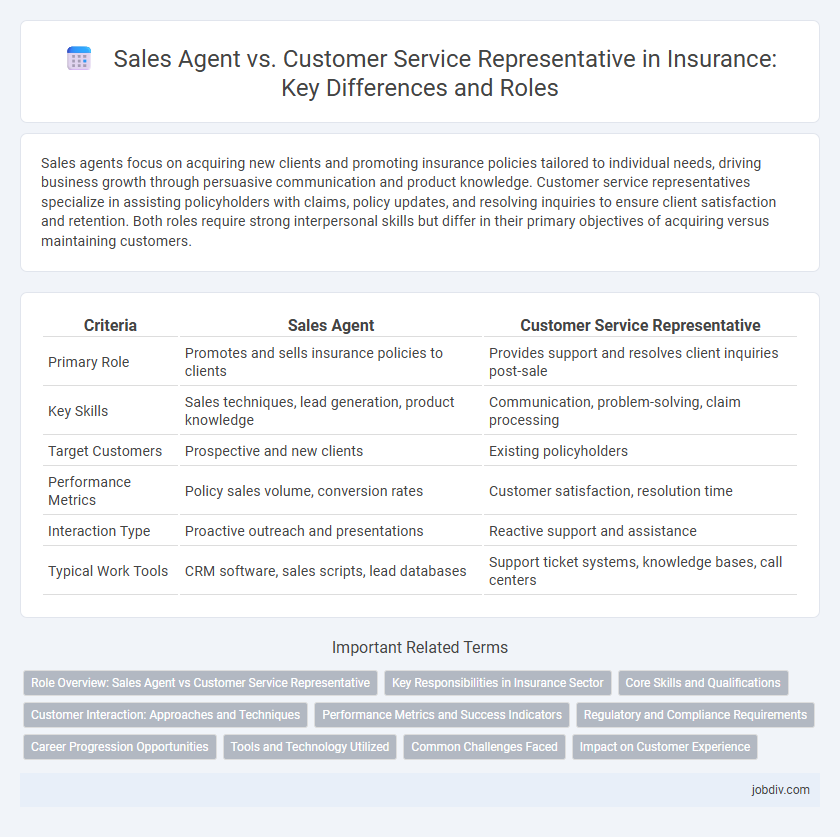Sales agents focus on acquiring new clients and promoting insurance policies tailored to individual needs, driving business growth through persuasive communication and product knowledge. Customer service representatives specialize in assisting policyholders with claims, policy updates, and resolving inquiries to ensure client satisfaction and retention. Both roles require strong interpersonal skills but differ in their primary objectives of acquiring versus maintaining customers.
Table of Comparison
| Criteria | Sales Agent | Customer Service Representative |
|---|---|---|
| Primary Role | Promotes and sells insurance policies to clients | Provides support and resolves client inquiries post-sale |
| Key Skills | Sales techniques, lead generation, product knowledge | Communication, problem-solving, claim processing |
| Target Customers | Prospective and new clients | Existing policyholders |
| Performance Metrics | Policy sales volume, conversion rates | Customer satisfaction, resolution time |
| Interaction Type | Proactive outreach and presentations | Reactive support and assistance |
| Typical Work Tools | CRM software, sales scripts, lead databases | Support ticket systems, knowledge bases, call centers |
Role Overview: Sales Agent vs Customer Service Representative
Sales agents in insurance focus on generating new business by identifying potential clients, explaining policy options, and closing sales to meet targets. Customer service representatives handle existing policyholder inquiries, process claims, and provide ongoing support to ensure client satisfaction and retention. Both roles require strong communication skills but prioritize different stages of the insurance lifecycle: acquisition for sales agents and service maintenance for representatives.
Key Responsibilities in Insurance Sector
Sales agents in the insurance sector primarily focus on acquiring new clients, presenting policy options, and customizing coverage plans to meet individual needs, driving revenue growth. Customer service representatives handle policy renewals, claims processing, and addressing client inquiries, ensuring customer satisfaction and retention. Both roles require in-depth knowledge of insurance products, regulatory compliance, and effective communication skills to support the company's objectives.
Core Skills and Qualifications
Sales agents in insurance require strong persuasive communication, negotiation expertise, and a deep understanding of product portfolios to effectively convert leads into policyholders. Customer service representatives prioritize problem-solving abilities, empathy, and detailed knowledge of claim processes to assist clients with inquiries and resolve issues promptly. Both roles demand comprehensive insurance knowledge, regulatory awareness, and proficiency in CRM software to enhance client interactions and ensure compliance.
Customer Interaction: Approaches and Techniques
Sales agents employ persuasive communication techniques and proactive outreach to attract new clients and close insurance policies effectively. Customer service representatives focus on empathetic listening and problem-solving skills to handle claims, policy inquiries, and resolve customer issues, ensuring client satisfaction and retention. Both roles utilize CRM software and personalized communication to maintain strong customer relationships and enhance overall service quality.
Performance Metrics and Success Indicators
Sales agents in insurance are primarily measured by metrics such as policy conversion rates, sales volume, and client acquisition speed, reflecting their ability to close deals and drive revenue growth. Customer service representatives focus on success indicators like customer satisfaction scores (CSAT), average handling time (AHT), and first contact resolution (FCR), highlighting their efficiency in addressing client inquiries and maintaining retention. Both roles use performance data to optimize interactions, but sales agents emphasize growth metrics while customer service representatives prioritize support quality and client loyalty.
Regulatory and Compliance Requirements
Sales Agents in insurance must strictly adhere to regulatory standards by ensuring accurate policy disclosures and proper licensing to maintain compliance. Customer Service Representatives focus on handling client inquiries while safeguarding sensitive data according to privacy laws such as HIPAA and GDPR. Both roles require ongoing training to meet evolving compliance mandates regulated by bodies like the NAIC and FINRA.
Career Progression Opportunities
Sales agents in insurance often have direct paths to higher earnings through commissions and the potential to become agency managers or regional directors. Customer service representatives typically progress into specialized roles such as claims adjusters, underwriting assistants, or team supervisors, emphasizing expertise and operational knowledge. Both career tracks offer advancement, but sales roles usually provide faster financial growth, while customer service roles prioritize skill development and internal promotion.
Tools and Technology Utilized
Sales agents in insurance leverage advanced CRM platforms, lead management systems, and AI-driven analytics tools to identify prospects, personalize pitches, and streamline policy sales. Customer service representatives predominantly utilize integrated call center software, ticketing systems, and knowledge bases to efficiently resolve inquiries, process claims, and maintain policyholder satisfaction. Both roles increasingly depend on cloud-based applications and mobile technologies to enhance real-time communication and data accessibility.
Common Challenges Faced
Sales agents and customer service representatives in insurance often face the challenge of managing complex policy information while ensuring clear communication to avoid misunderstandings. Both roles must handle high volumes of inquiries, frequently encountering frustrated customers due to claim denials or policy changes. Balancing the need for regulatory compliance with delivering personalized service remains a critical obstacle for these professionals.
Impact on Customer Experience
Sales Agents drive customer acquisition by offering personalized product knowledge and tailored solutions that build trust and encourage commitment. Customer Service Representatives enhance retention through prompt issue resolution, policy management, and ongoing support, fostering long-term satisfaction. Together, they shape a seamless customer experience by balancing proactive sales engagement with responsive after-sales service.
Sales Agent vs Customer Service Representative Infographic

 jobdiv.com
jobdiv.com